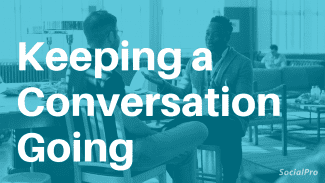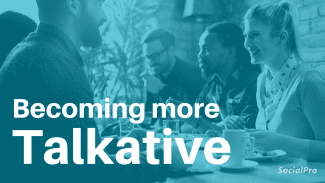“I have no idea how some people always have something to talk about. I don’t know how to talk about nothing. When I try, there is always an awkward silence. How can I always have something to talk about?”
It’s not easy to know what to talk about with people, especially when we’re out of practice. Whether you’re an introvert, suffer from social anxiety, or just haven’t socialized for a while, this guide will help you learn what to talk about when you have nothing to talk about or have nothing in common with other people.
1. Ask questions
People usually love talking about themselves. The best way to always have something to talk about is to be interested in the person you’re talking to.
Utilize the FORD method and getting-to-know-you questions to get people talking about themselves. Be prepared to answer any of the questions you ask yourself.
2. Master small talk and safe topics
Learn the art of commenting on the current situation. Small talk can be a great stepping stone to a deeper conversation if you do it right.
Safe topics to start with include the weather, food (“Have you gotten a chance to check out the new Indonesian place?”), and school or work. Try to steer from controversial and sensitive topics like politics until you get to know someone better.
Do you hate small talk? We have a guide with 22 small talk tips for you.
3. Develop your interests
The fuller your life is, the more you will have to share with others. Talk a walk outside and notice what’s going on around you. Try new hobbies and learn new skills. Listen to podcasts, read books, and follow the news.
Once you have things in your life you find interesting, you can start to share things you’ve learned with others (e.g., “I listened to this podcast the other day, and they were saying something really interesting about free will…”).
4. Know your audience
Say you watched a basketball game the other night. It may be a great idea to talk about how suspenseful the game was—as long as you’re talking to someone else who has similar interests. If someone isn’t into sports, they won’t be interested in the details of the game.
Don’t try to pretend to be someone else, but try to talk about things your conversation partner will also find interesting. Pay attention to their body language to see how they’re feeling about the conversation.
5. Share about yourself
There is something you can always talk about – yourself. Practice slowly opening up to people and sharing about yourself.
Let’s say you’re in a conversation with someone, and they ask you how your week went. You can say, “It was fine, yours?” That’s a typical answer when someone asks you how you’re doing in passing, as a way to be polite. But if you’re trying to get a conversation started, saying “Fine” will shut it down.
Instead, you can use the opportunity to share something about your week that can turn into a deeper conversation. You can even use what you share to ask them a related question.
So if someone asks, “How was your week?” you could say:
- “I’ve been trying to learn how to paint using Youtube tutorials. Have you ever tried learning something from Youtube?”
- “I’m pretty tired because I have been working several long shifts this week. What have you been up to?”
- “I checked out that TV show you mentioned. It was really fun! Who was your favorite character?”
- “I’ve been researching new phones because it seems my current one is nearing the end of its life. Do you recommend your phone?”
If you’re still struggling with opening up, read our guide to opening up and reasons why you may hate talking about yourself.
6. Learn to be a good listener
You don’t always have to have things to talk about for people to like being around you. In fact, good listeners can be pretty rare and very appreciated.
Becoming a great listener is about more than just hearing what people say. Practice active listening to show that you’re interested in what they’re saying. We have some tips if you find yourself zoning out in conversations.
Validate their feelings by saying things like, “I would be upset in that situation, too.”
Ask before giving advice. Practice saying things like, “Do you want my opinion, or do you just want to be heard right now?”
7. Be generous with praise
If you’re impressed with your conversation partner or a positive thought about them goes through your head, share it. People love receiving compliments and hearing good things about themselves.
For example:
- “That was really well said.”
- “I’m noticing how you always look so put together. You have such a good sense of style.”
- “Wow, you just went out and did that? That’s really brave.”
8. Try to enjoy the conversation
What makes a good conversation? One where the involved parties are enjoying it. Remember that you’re one of the people involved in a conversation, and you can steer it in a direction that you’ll enjoy.
Try to get comfortable bringing up topics that interest you. Your conversation partner may be just as interested.
Related: how to get better at talking.
9. Practice word association
What comes up when you read “Netflix”? How about “puppy”? We have associations tied to different words and topics.
Sometimes when we’re nervous around people, we don’t hear our inner voice very well. You can practice becoming familiar with your inner voice by using a random word generator to practice word association at home.
As you get more comfortable recognizing your inner associations, you’ll start to feel more comfortable doing it in conversations. And that’s how we build a back-and-forth. Our friend or conversation partner tells us a story, and it reminds us of something that happened to us years ago. We bring it up, and our friend remembers a similar story they read in a book once… And on and on we go.
What to talk about in specific situations
With strangers
One of the easiest ways to start talking to someone new is to state a fact and pair it with a question.
Say you’re in your regular coffee shop and someone is in line behind you. You can state a fact (“I’ve never seen this place so full”) and ask a question (“Have you been living here long?”). Then, gauge by their response whether they’re interested in continuing the conversation. Some people aren’t interested in having conversations when they’re buying their morning coffee, and it doesn’t mean anything about you.
Read our ten tips for talking to strangers for more advice.
With a friend
As you get to know people and become their friend, you’ll learn what they value, what they enjoy talking about, and what’s going on in their lives. With a new friend, you can slowly open up and share what’s going on in your life lately. As you get closer, you can share more intimate things.
Remember to ask your friends questions about what’s going on in their lives and follow up on things they previously mentioned.
Online
Every online community is different. Specific social media pages have their own slang and ways of speaking. You can join communities and discuss things according to your interest. Remember that there’s always a person on the other end of the screen, so be kind. Be careful not to give out too much personal information, and be mindful of what you share on accounts attached to your real name.
At work
Start by sharing safe and neutral things about your week and hobbies. For example, your house being renovated is safe, while your roommates fighting and keeping you up all night is less so.
We have a guide on how to socialize at work for in-depth tips regarding workplace conversations.
On Tinder and dating apps
The best way to start a conversation on a dating app is to reference and follow up on something they mentioned in their profile. Let’s say they wrote that they love traveling. You can ask what place they loved most and mention your favorite country.
What do you do if they didn’t write anything about themselves? Try to pick up something from the photos they included. Another approach is to ask a question to spark a conversation. Try not to start with the regular getting-to-know-you stuff just yet. There will be time for that later.
Instead, try to ask a question that could spark a conversation you find interesting. For example, you could try:
- “I’m trying to catch up on shows people told me I have to watch. Do you think I should get started with Sopranos or Breaking Bad?”
- “Help me out—I want to cook something new tonight, but I don’t have any ideas. Any suggestions?”
- “I just had a really embarrassing meeting at work. Please tell me I’m not the only one having a tough week!”
You can get inspired by our list of small talk questions.
There isn’t a clear consensus on talking to people on dating apps because people come in with different expectations. Some people talk to many other people at once and will just stop replying or “ghost.” It’s good to remember that most people find dating apps challenging—you’re not alone in this. Don’t take it too personally if someone stops responding.
In a relationship
Most people expect their boyfriend or girlfriend to be their best friend or one of their best friends. That means that there’s an expectation of talking about interests, difficulty, feelings, and day-to-day stuff.
For example, if your girlfriend says that she had a conflict with her friend, she’ll likely expect more than a “Well, that sucks.” She’ll hope that you will ask questions and listen to what happened.
Similarly, your boyfriend or girlfriend will expect you to tell them things that are going on in your life. If they ask how your day was, it’s because they want to know. Don’t worry that something isn’t “important enough” to share. If it impacted your day, you can talk about it with your partner.












